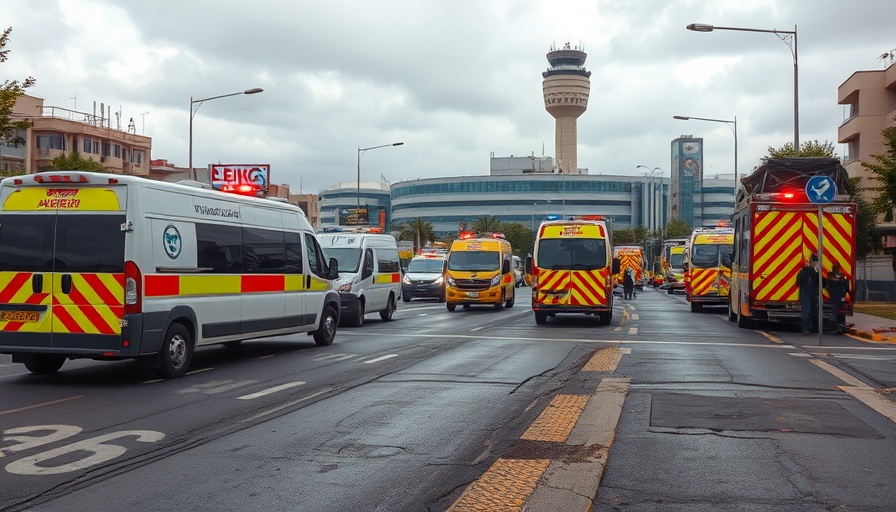
A Missile Strike at a Landmark Airport: What Happened
On a tense Sunday, May 4, 2025, a ballistic missile launched by the Iranian-backed Houthi militia struck perilously close to Ben Gurion Airport, Israel's main international terminal near Tel Aviv. This attack not only raised significant concerns about the security of one of Israel's most vital transport hubs but also drew immediate attention from global leaders, further escalating an already fraught situation in the Middle East.
Immediate Consequences of the Attack
The missile strike led to the temporary suspension of flights as a precautionary measure. Fortunately, initial reports indicated no fatalities, but several injuries were recorded—particularly among individuals who found themselves in the chaos following the blast. Four people received medical treatment for minor injuries, while others were injured while scrambling for safety.
Israel’s Response and Regional Implications
In the aftermath, Israeli Prime Minister Benjamin Netanyahu convened an urgent meeting of his security cabinet, emphasizing the need for a decisive response. His vow of retaliation exemplifies a broader trend of escalating tensions in the region, further complicated by alliances and historical grievances. The incident has revived fears that hostilities might spiral out of control, particularly with Netanyahu describing the attack as a significant threat to national security.
Global Reaction
President Trump, commenting from his platform on social media, stated that Iran would be held accountable for the attack. Netanyahu echoed Trump’s sentiments, underscoring the necessity of international cooperation in addressing such threats. This highlights the interaction between local events and international politics, as nations consider their strategic alignments in the face of aggression.
The Houthi Perspective: Understanding Motivations
The Houthi militia's continued strikes on Israel symbolize their defiance against not only Israel but also against what they perceive as a broader coalition of adversaries. With their unmistakable ties to Iran, their actions can be interpreted through the lens of regional power dynamics, where various forces vie for influence and control. Understanding the Houthis’ motivations, rooted in a complex blend of political, religious, and territorial aspirations, is crucial to grasping the full scope of the conflict.
Future Predictions: What Lies Ahead?
The trajectory of the situation following the missile strike is fraught with uncertainty. Analysts project that the likelihood of further military exchanges between Israel and Houthi forces increases as both sides reinforce their positions. This escalation could potentially involve other nations and factions, prompting a regional conflict that might spill beyond the borders of the current hotspots.
International Relations and Peace Efforts
This episode serves as a clarion call for the international community to renew efforts towards diplomatic solutions in the Middle East. World leaders and organizations face the formidable challenge of navigating the tangled web of alliances and hostilities. Brightening prospects for peace hinge on dialogue and negotiations, which remain elusive amidst the backdrop of such provocations.
Historical Context: The Long Shadow of Conflict
The recent missile strike can be traced back through decades of bitterness and discord within the region. Understanding the historical grievances that fuel the current animosities is essential for comprehending the complexities of the ongoing situation. Factors such as the 2015 Houthi takeover of Yemen have significantly shaped their current military capabilities and objectives.
Public Sentiment: How Citizens React
In the days following the attack, public sentiment in Israel reflects a mix of resilience and concern. Many citizens are rallying around the support of their government, yet there exists an underlying anxiety about the safety of public places, particularly transport hubs. The psychological impact of such attacks cannot be underestimated as communities seek to find equilibrium between open-mindedness and security.
Conclusion
The missile strike near Tel Aviv's airport is not merely an incident; it is a stark reminder of the volatility within the Middle East. It serves as a pivotal moment that may shape future discussions around security, diplomacy, and the pressing need for conflict resolution.
 Add Row
Add Row  Add
Add 




Write A Comment